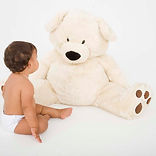At the ages of 3-6 months, your child will experience significant changes, starting from his ability to coordinate and synchronize between his many senses, through deepening his acquaintance with his body and the environment, and the continuous development of his motor skills that are evolving with each passing day.
Movement – first, his hands continue to be an attraction, only this time the game gets better! Watch him slowly cross his fingers, play with his hands by getting them closer to his mouth, and around the age of 5 months the legs start to join the party. In the next few months, you will see how he learns to hold objects in his palm. He might even pass it from one hand to the other. Later on, he will reach out his hands towards objects that you give him, and towards the age of 6 months, he might even manage to reach his hands towards objects that are in reach (without your help), grab them and bring them closer. Just like you have been doing in the past few months, continue playing with him while he is on his tummy, under your supervision, and watch him while he lifts his head and chest while using his elbows or palms. By the way, some children might even start sitting by themselves towards the age of 6 months, but you shouldn’t worry – there is no need to rush.
Eyesight – at this stage your child can already focus on small objects and differentiate between colors (mainly green and red). His distant sight is improving and so is his ability to follow moving objects with his eyes, including movement in the horizontal plane.
Hearing – you can notice that although he doesn’t understand everything, your child can hear quite a lot. In the following months, you will see that he keeps responding to the sounds in his environment, even if they are beyond his range of vision. He might even turn his head to the direction of the sound, but it's ok if he's still not doing so (everything will come at his time, don’t worry).
Language – it is true, he doesn’t understand everything and it will take some time until he will be able to share with you his thoughts, but in the meantime, you can see him growing and developing in baby steps. By now he can respond to the sound of your voice and start to begin the meaning of the word “no”. He makes sounds and uses them to show his discontent (so small and already has criticism!). He can also differentiate the intonation of your voice when you are mad at him or when you speak softly.
In the social field, you can see how he continues to enjoy social games and reacts to his environment, whether it is with a smile, a laughter or an imitation of an expression. He will stop crying and calm down when you speak to him softly to relax him (it doesn’t always work). Slowly you will see how he will curiously discover new images in the mirror, including himself.
In the cognitive field – from the day he was born, your child is exposed to so much information from the environment and there is so much to learn. As he grows, his inner detective grows accordingly, and he will start finding hidden objects (like a toy placed under the table), will investigate everything with his hands and mouth and start to understand cause and effect – for example, when he plays the rattle it makes noises (a discovery that might exhaust the tired parent). When he throws an object on the ground you will pick it up, so he will learn that sometimes his actions have consequences and affect the environment.
Do you know the famous “pica-boo” game? It might help him understand that things don't really disappear. Up until now, your child thought that every object he doesn’t see simply doesn’t exist, so that when you returned a game to its place at the end of the day he thought it has just disappeared. Slowly he will realize that the world continues to exist even if he doesn’t see it and that the games you have stored the night before are the same ones you took out the next morning. This understanding will grow stronger the more you play the “pica-boo” game so that even when you are hiding your face you are still there.
Enjoy watching him grow and develop with every passing day! As we have emphasized before, each child will find his own pace, and you shouldn’t worry if not everything is done according to the textbook. Although, there are some things you should pay attention to and consult your pediatrician if your child has reached the age of 6 months and still hasn’t achieved the following milestones:
- Cross fingers and play with his hands
- Hold an object that is placed in his palm
- Reach with his hands towards an object and grab it
- Follow moving objects in the horizontal plane (up-down)
- Respond to sounds and voices, including making his own sounds
Last updated: May 2017
Authors - Tamar Sudry BA MED, Dr. Yair Sadaka MD Ph.D., pediatrician, Pediatric neurologist
Sources:
The Israeli ministry of health
